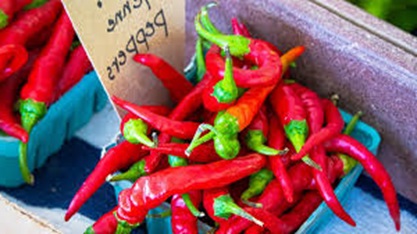Side Effects of Too Much Pepper
Side Effects of Too Much Pepper
Overindulging in food may lead to gastrointestinal problems such as heartburn, indigestion, and other problems.
If it accidentally gets into the lungs, black pepper could even result in death, especially in children.

In some cases, individuals who are allergic to black pepper will have a severe respiratory reaction
Side Effects of Too Much Pepper: Possible risks and disadvantages
- Breathing difficulties
- Pain and redness in the eyes or on the skin.
- Diarrhea
- Respiratory distress (if inhaled)
Consuming too much pepper, particularly in the form of hot peppers or chili peppers, can lead to other side effects:
Side Effects of Too Much Pepper: Gastrointestinal distress
Excessive consumption of spicy peppers can irritate the lining of the stomach and intestines, leading to symptoms such as abdominal pain, cramps, nausea, vomiting, and diarrhea.
Side Effects of Too Much Pepper: Heartburn and acid reflux
Spicy peppers can trigger heartburn and acid reflux in some individuals, particularly those with gastroesophageal reflux disease (GERD) or a sensitive stomach.
This occurs when the spicy compounds in peppers stimulate the production of stomach acid, leading to discomfort and a burning sensation in the chest.
Increased risk of peptic ulcers
Although spicy food doesn’t cause peptic ulcers, it can exacerbate symptoms in individuals with ulcers.
Spicy peppers can irritate the lining of the stomach and worsen existing ulcer symptoms, such as pain and discomfort.
Gastrointestinal bleeding
In rare cases, excessive consumption of spicy peppers may lead to gastrointestinal bleeding, particularly in individuals with pre-existing conditions such as gastritis or inflammatory bowel disease (IBD).
Side Effects of Too Much Pepper: Hemorrhoids
Spicy food can worsen symptoms of hemorrhoids or anal fissures, leading to increased pain, itching, and discomfort in the anal region.
Side Effects of Too Much Pepper: Skin irritation
Handling hot peppers can cause skin irritation, particularly if the oils from the peppers come into contact with sensitive areas of the skin or mucous membranes, such as the eyes or nose.
This can result in a burning sensation, redness, and inflammation.
Side Effects of Too Much Pepper: Allergic reactions
Some individuals may be allergic to certain compounds found in peppers, such as capsaicin, which can trigger allergic reactions ranging from mild itching and hives to more severe symptoms such as difficulty breathing and anaphylaxis.
It’s essential to consume spicy peppers in moderation and be mindful of your body’s reaction to them.
If you experience persistent or severe symptoms after consuming spicy food, it’s advisable to consult with a healthcare professional.
Moreover, if you have underlying medical conditions such as GERD, ulcers, or IBD, it’s best to avoid excessive consumption of spicy food to prevent exacerbating symptoms.

FAQs on the Side Effects of Too Much Pepper
Can excessive consumption of pepper be detrimental to health?
Overindulging in pepper can result in gastrointestinal discomfort, manifesting as heartburn, indigestion, and stomach pain.
This is attributed to piperine, a compound present in pepper, which has the potential to irritate the stomach lining and induce inflammation.
What are the effects of pepper on the body?
Black pepper and its active component, piperine, are believed to possess potent antioxidant and anti-inflammatory properties.
Studies in laboratories indicate that black pepper could potentially enhance cholesterol levels, regulate blood sugar, and promote brain and gut health.
What are the implications of daily pepper consumption?
Regular consumption of black pepper may mitigate the risk of colon cancer, constipation, diarrhea, and various bacterial infections.
However, excessive intake can pose health risks. Therefore, it’s advisable to incorporate only a moderate amount into your daily diet.
Is consuming large quantities of chili harmful?
The adverse effects of excessively spicy food are notable.
The intensity of the spiciness correlates with the severity of stomach and duodenal ulcers.
Besides, consuming excessive chili can lead to insomnia due to elevated body temperature, significantly disrupting daytime sleep patterns.
Can excessive chili consumption harm the stomach?
Capsaicin, found in chili peppers, has the potential to irritate the stomach and intestines.
While some individuals may tolerate this irritation well, others may experience diarrhea, particularly those with sensitive stomachs.
Proper digestion is crucial for overall health, beginning with the first bite of food and culminating in bowel movements.
Is chili detrimental to stomach health?
In certain instances, excessive chili consumption may lead to digestive and intestinal issues, as capsaicin can disturb the digestive system, increasing the likelihood of diarrhea. Individuals with stomach ulcers or related conditions should exercise caution when consuming chili



